The Synod meets from October 10-24.
Tag: Eastern Christianity
Eleuterio Fortino, RIP: the soul and motor of the Christianity Council at the Vatican
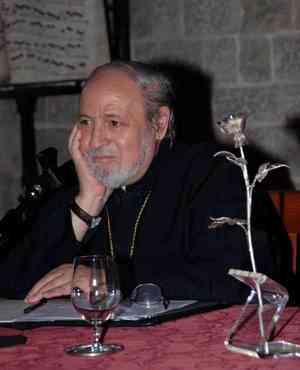 On 22 September 2010, a giant in the world of
On 22 September 2010, a giant in the world of
ecumenism and Eastern Christianity died after living with illness. No one can
doubt the sentiment expressed by the Pope saying that Monsignor Fortino had a “generous
commitment with intelligence and passion at the service of unity.” The Pope
last saw Monsignor Fortino on June 28 with the delegation of the Ecumenical
Patriarch Bartholomew I. A telegram was sent through his secretary of state,
Cardinal Tarcisio Bertone, honoring the life of the undersecretary (third in
charge) of the Pontifical Council for Promoting Christian Unity, who focused
particularly on relations with the Orthodox Churches.
Meeting the new rector at the Pontifical Oriental Institute
In May, the announcement of a new rector was made that the Pontifical Oriental Institute in Rome, a Jesuit work for the universal Church, Jesuit Father James McCann. The new rector is a member of the Chicago Province of Jesuits, is 61 years old and was ordained a priest in 1979.
Archbishop Francis Mansour Zayek, RIP
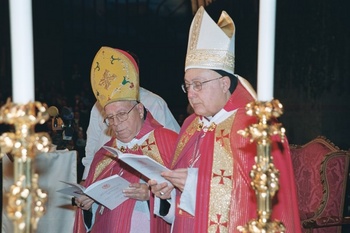 With great sadness word was received today of the passing to the Lord of His Excellency, Archbishop Francis Mansour Zayek, 90, emeritus archbishop of the Eparchy of Saint Maron of Brooklyn, on the 14 September 2010, the Exaltation of the Holy Cross.
With great sadness word was received today of the passing to the Lord of His Excellency, Archbishop Francis Mansour Zayek, 90, emeritus archbishop of the Eparchy of Saint Maron of Brooklyn, on the 14 September 2010, the Exaltation of the Holy Cross.
The fate of Eastern Christianity to be discussed in October; but what about now?
The hard work of collaborating and witnessing to Jesus Christ for 14 million Eastern Christians is indeed a difficult task, but one that is only sustained by prayer, mutuality and study.
Saint Sharbel Makhlouf
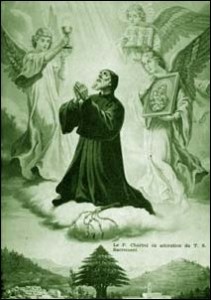 The mountain heights of Lebanon
The mountain heights of Lebanon
Resound with songs of joy;
The cedars of that ancient land
Stand tall as we employ
Our hymns of praise and thankfulness
For Sharbel’s saintly ways,
Lived out in strict humility
That guided all his days.
True monk and hermit of the hills,
Saint Maron’s modest son
Scorned wealth and comfort in his life
That heaven’s crown be won.
Of Mary, heaven’s Queen and Gate,
Devoted son was he,
Who cherished all the ancient rites
With great humility.
Fierce lover of the lowly life,
True father of the poor,
As you have done, so help us all
To struggle and endure,
That Christ be praised in ev’ry life,
That riches not ensnare
Or rule us in our daily walk;
That strong may be our prayer!
O Father, Son, and Spirit blest,
One God in persons three,
Receive this hymn we offer now,
And keep your Church e’er free
To follow, as Saint Sharbel did,
Enflamed with love so bright
That we, with eyes fixed firm on Christ,
May vanquish sin’s dark night.
J. Michael Thompson
Copyright © 2009, World Library Publications
CMD; FOREST GREEN, RESIGNATION
Praying the Maronite Liturgy
Today, I was one of the acolytes at St Ann Melkite Church (Waterford, CT) for the Maronite Liturgy celebrated in the another Eastern Church, the Melkite Church. It is not typical for one Liturgy to be celebrated in a church of another Eastern Church but since there are a number of Maronite Catholics who live in southeastern Connecticut it was judged rightly to have the Maronite Liturgy this weekend. The Liturgy was done in both English and Arabic. My friend Archimandrite Edward Kakaty welcomed visiting Maronites with their priest from Our Lady of Lebanon Church, Waterbury, CT, to St Ann’s.
Basil M. Schott, OFM, Ruthenian metropolitan archbishop RIP
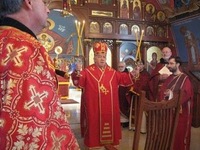 After struggling with Leukemia Metropolitan Basil Myron Schott, OFM, died this morning. He was 71. I have fond memories of meeting the archbishop and always found him to be a kind and holy man.
After struggling with Leukemia Metropolitan Basil Myron Schott, OFM, died this morning. He was 71. I have fond memories of meeting the archbishop and always found him to be a kind and holy man.
Saint Ephrem the Syrian
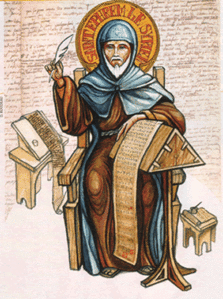 It is indeed fitting to honor the blessed deacon of
It is indeed fitting to honor the blessed deacon of
Edessa for his desire that the preaching of the divine word and the training of
his disciples rest on the purity of Sacred Scripture. He also acquired honor as
a Christian musician and poet. He was so accomplished in both arts that he was
called the “lyre of the Holy Spirit.” From this, Venerable Brothers,
you can learn what arts promote the knowledge of sacred things. Ephrem lived
among people whose nature was attracted by the sweetness of poetry and music.
The heretics of the second century after Christ used these same allurements to
skillfully disseminate their errors. Therefore Ephrem, like youthful David
killing the giant Goliath with his own sword, opposed art with art and clothed
Catholic doctrine in melody and rhythm. These he diligently taught to boys and
girls, so that eventually all the people learned them. In this fashion he not
only renewed the education of the faithful in Christian doctrine and supported
their piety with the spirit of the sacred liturgy, but also happily kept
creeping heresy at bay.
to sacred matters as Theodoretus stresses. The metric rhythm, which our saint
popularized, was widely propagated both among the Greeks and the Latins. Indeed
does it seem probable that the liturgical antiphonary with its songs and
processions, introduced at Constantinople in the works of Chrysostom and at
Milan by Ambrose (whence it spread throughout all of Italy), was the work of
some other author? For the “custom of Eastern rhythm” deeply moved
the catechumen Augustine in northern Italy; Gregory the Great improved it and
we use it in a more advanced form. Critics acknowledge that that “same
Eastern rhythm” had it origins in Ephrem’s Syrian antiphonary.
wonder then that many of the Fathers of the Church stress the authority of St.
Ephrem. Nyssenus says of his writings, “Studying the Old and New
Scriptures most thoroughly, he interpreted them accurately, word for word; and
what was hidden and concealed, from the very creation of the world to the last
book of grace, he illumined with commentaries, using the light of the
Spirit.” And Chrysostom: “The great Ephrem is scourge of the
slothful, consoler of the afflicted, educator, instructor and exhorter of
youth, mirror of monks, leader of penitents, goad and sting of heretics,
reservoir of virtues, and the home and lodging of the Holy Spirit.” Certainly
nothing greater can be said in praise of a man who, however, seemed so small in
his own eyes that he claimed to be the least of all and a most vile sinner”
(12-14).
Pope Benedict XV
Principi
Apostolorum Petro (On St. Ephrem the Syrian), 5 October 1920
Fr Ragheed Aziz Ganni: 3rd anniversary of death
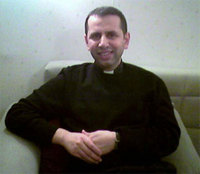 June 3rd is quickly becoming a date that most Christians will not forget too easily: 1) the liturgical memorial of Saint Charles Lwanga, 19th century African martyrs; 2) the death of Blessed Pope John XXIII; 3) the murder of Father Ragheed and his companions; and now 3) the murder of Bishop Luigi Padovese, OFM Cap.
June 3rd is quickly becoming a date that most Christians will not forget too easily: 1) the liturgical memorial of Saint Charles Lwanga, 19th century African martyrs; 2) the death of Blessed Pope John XXIII; 3) the murder of Father Ragheed and his companions; and now 3) the murder of Bishop Luigi Padovese, OFM Cap.